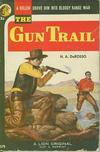In the LA Times Book Review today Eugen Webber, always on the dull edge, reviews Robert Parker’s COLD SERVICE and a bunch of other books that came out six months ago. But I’ll give Eugen the benefit of the doubt and assume that the paper held his column until now. They should have kept on holding it. The man’s reviews are cliche ridden and border on incoherent. Judge for yourself:
"Cold Service," the title of Robert B. Parker’s latest, refers to revenge, said to be a dish best served cold. Hot, cold or lukewarm, revenge is urgently called for, because Spenser’s buddy Hawk has been shot in the back and seriously injured by Ukrainian mobsters who crept into our country yearning to breathe free at someone else’s expense. Now the thugs and those behind their deviltries have to be punished. Not by agencies of the Law, which are as capricious as the Law itself, but by Hawk, once he recovers, aided and abetted by Spenser and the old gang. That alone will satisfy our friends, if not the lawbooks.
Vengeance is mine, sayeth someone or other. Vengeance is illegal, sayeth the Law: Society exacts it in hygienic, compassionate, politically correct ways. But Hawk is not convinced that murderous and greedy perps will be brought to book before they perp some more. In Hawk’s script, ruthless retribution for ruthless crimes is laconic and swift. Francis Bacon, the Elizabethan intellectual, described revenge as "a kind of wild justice, which the more man’s nature runs to, the more ought the law to weed it out." But Bacon was a corrupt casuist, and his thoughts do not impress Hawk. Nor Spenser either. Yet Spenser’s resolve is tested by Susan, his longtime ladylove, and their exchanges color Bacon’s argument.
Scragging Ukrainians and their allies may satisfy, but so do many trivial indulgences liable to raise our cholesterol level. Official justice, on the other hand, just like the wild variety, veers according to money, power, lies, deceptions and self-deceptions. Rancor reflects no higher moral imperative than legal or prudential prescriptions. Pending resolution of portentous questions, Spenser, Hawk and Susan will handle their quandaries deftly. Their high-velocity patter does not age. Violence is concise, alcoholic intake moderate, wrangling warmed by wit and smoothed by stimulants. Proof that Parker is near the top of his form, which is nothing to sneeze at.
Nothing to sneeze at? C’mon. Is this a joke? What’s next… "Elmore Leonard’s prose is nothing to shake a stick at?" "Michael Connelly once again sends Harry Bosch up a creek without a paddle?" "For Kinsey, this time finding the killer is like looking for a needle in the haystack." Doesn’t Eugen have an editor? The rest of his column is just as bad. He has this to say about George Pelecanos’ DRAMA CITY:
"Melodrama City" might be more to the point, but what matters is that Pelecanos is the foremost chronicler of our urban wastelands. His prose serves up vivid versions of them that we won’t find in tourist guides: drink, drugs, slaughter, random callousness, casual kindness, tuna sandwiches, sounds that currently pass for music and the rest.
These aren’t reviews. I’m not sure what the heck they are except, collectively, another dramatic example that it’s time to replace Eugen with a real mystery critic, someone with knowledge of the genre, who is respected in the field, and who can actually write coherently without resorting to cliches.
The LA Times doesn’t have to search any further than a few pages earlier in the same issue, where Dick Lochte reviews John Shannon’s latest Jack Liffey novel. Lochte’s knowledge and appreciation of the genre is deep. His opinions are respected. He’s also open to new authors who reinvigorate the mystery writing field with unconventional approaches to standard formulas. Dick is the guy who should be writing the mystery review column.
While I’m on the subject of the LATimes Book Review, would someone please tell them that readers don’t appreciate it when reviewers not only give away the entire plot of the book, but the surprise plot twists as well? That’s exactly what Jane Ciabattari does in her review of ENVY. I wasn’t planning on reading the book but still, thanks a lot, Jane.
Wasserman is gone, but the LATBR still sucks.
UPDATE (7-11-05) My brother Tod has a "conversation" with Eugen and Sarah Weinman considers Eugen as an example of how NOT to review books.

